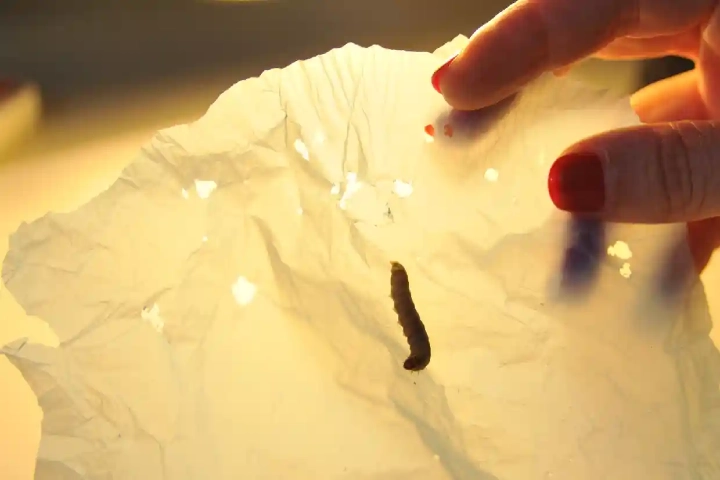

The Wax Worm eating the plastic (Pic. Courtesy CSIC Communications Department/PA)
A chance discovery could help humankind get over the biggest problem facing it on a global scale – proliferation of plastic from mountain peaks to depths of oceans. As per a report in theguardian.com it was found that saliva of wax worm larvae has enzymes that break down plastic bags real fast.
A scientist who is also an amateur beekeeper after cleaning the hive kept the larvae in a plastic bag and found holes as they had eaten it. Researching on this, scientists found that saliva of the insect may be “a depository of degrading enzymes which could revolutionise [the cleanup of polluting waste]”.
Sharing details Dr. Federica Bertocchini of Madrid’s Biological Research Centre said: “My beehives were plagued with wax worms, so I started cleaning them, putting the worms in a plastic bag. After a while, I noticed lots of holes and we found it wasn’t only chewing, it was [chemical breakdown], so that was the beginning of the story.”
Wax worms are moth larvae that invade beehives. They can take apart polyethylene at normal temperature which could prove to be a cutting edge and cost-effective method of plastic recycling.
Thirty percent of plastic production consists of polyethylene which is used for bags and as packing material, making it a major plastic pollutant. At present its recycling involves mechanical processes and creation of lower-value products. Its chemical breakdown could yield important chemicals and also a method to create new plastic.
Further, the enzymes can help in initial breaking of the polymer chains at normal temperatures, in water and at neutral pH. At present this process requires a lot of heating.
The commercial scaling of this process will take time. Explaining this, Dr. Clemente Arias, from the Spanish research centre said: “We need to do a lot of research and think about how to develop this new strategy to deal with plastic waste.”
Details of the study which was published in the journal Nature Communications have spotted 200 proteins in the saliva of wax worm and zeroed on two that had the plastic-eating effect. Elaborating this aspect, scientists said: “This study suggests insect saliva might [be] a depository of degrading enzymes which could revolutionise the bioremediation field.”
The larvae of wax worms live and grow in the honeycombs of beehives while feeding on beeswax and this may have helped them evolve the enzymes. Another explanation suggests that these enzymes came about to deal with toxic chemicals that plants produced as defence and these are similar to plastic.
Expressing hope in this new discovery, Prof. Andy Pickford who is Director of the Centre for Enzyme Innovation at the UK’s University of Portsmouth, said: “The reaction happens within a few hours at room temperature suggesting that enzymatic breakdown may be a route to making use of polyethylene waste.”
Meanwhile, scientists are also investigating the ability of beetles and butterfly larvae to eat plastic.
A 2021 study showed that bacteria in oceans and soils around the world are evolving to eat plastic. Enzymes numbering 30,000 were identified that help in breaking down 10 different types of plastic.
In 2020 a super-enzyme which rapidly decomposes plastic bottles made from PET plastic was found. Another bug was found in a waste dump eating polyurethane – a widely used plastic which is rarely recycled.
Plastic waste weighing millions of tonnes are dumped each year and reducing this is imperative through lesser consumption, methodical collection and treatment of the waste and its recycling.
Also read: Are superworms that eat and digest plastic the answer to waste disposal?
The ongoing "Haqooq Do, Dam Banao Tehreek" protest, led by Amir Quaid, entered its 25th…
The Indian Space Research Organisation on Thursday announced the successful completion of its SpaDeX mission's…
Taiwan's Ministry of National Defence (MND) reported 20 sorties of People's Liberation Army (PLA) aircraft,…
Prime Minister Narendra Modi and his Mauritius counterpart Navinchandra Ramgoolam have agreed to facilitate trade…
Baloch Human Rights Council Information Secretary Khurshid Ahmed on Thursday said that the Jaffar Express…
The Bangladesh Hindu Buddhist Christian Unity Council, the largest minority group in Bangladesh, claimed on…